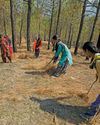
THE 1970s was arguably an epochal decade for the UN. The multilateral body held nine major global meetings during these years, each one focused on an emerging threat or opportunity that needed planetary response. It was as if the world was getting ready for a multi-front war on the crises. Nearly all countries participated in these conferences, marking them as global milestones.
The conferences were on the environment (the Stockholm Conference in 1971), on population and on food (both in 1974); on women (1975); on human settlement (1976); on water and on desertification (both in 1977); on science and technology for development (1979); and on new and renewable energy sources (1981). Over the next four decades, each of these conferences resulted in worldwide changes, often through landmark conventions and global treaties. Most of them were followed up by meetings that provided updates on action taken and reiterated commitments from countries.
But the UN Conference on Water, held in Mar del Plata, Argentina on March 14-25, 1977, stood out as more of an anomaly than a landmark. Unlike other conferences, it was not initiated by any government and no country took ownership of it, even though 105 governments ultimately participated in the meet. UN records show that three senior officials from the body’s now-defunct Centre for National Resources, Energy and Transport initiated the conference and pursued countries to propose it for approval by the UN General Assembly in 1975. Then, the world waited 46 years for a follow-up to this meet, which came as the UN’s “water conference” held in New York on March 22-24 this year.
This story is from the {{IssueName}} edition of {{MagazineName}}.
Start your 7-day Magzter GOLD free trial to access thousands of curated premium stories, and 9,000+ magazines and newspapers.
Already a subscriber ? Sign In
This story is from the {{IssueName}} edition of {{MagazineName}}.
Start your 7-day Magzter GOLD free trial to access thousands of curated premium stories, and 9,000+ magazines and newspapers.
Already a subscriber? Sign In

THE CIRCULARITY ARGUMENT
A circular economy can help India achieve its developmental aspirations while following the low-carbon pathway. It will also help address the challenges of waste management, pollution and overexploitation of natural resources. Industries are already innovating to reuse high-volume wastes and have shown that the transition can usher in both environmental and financial windfalls

Banking on flawed drug voluntary licences
The Medicines Patent Pool is pushing for more VLs, but its bad deal with Novartis on a cancer drug shows the pitfalls

Lasting solutions
For the first time, the UN has recognised the role of indigenous communities in tackling aridity. A repository of traditional knowledge India has the wherewithal to lead the way

IMD at 150
India's journey into modern weather forecasting took a decisive turn 150 years ago with the establishment of India Meteorological Department during the British rule. The agency has come a long way since then, shaping the way the country predicts and responds to its diverse climate challenges

Every drop counts
In drought-prone Marathwada region, 14 villages have managed to counter water shortage by budgeting the resource

Threat to survival
Hollongapar Gibbon Sanctuary in Assam faces ecological challenges as railway electrification and hydrocarbon exploration endanger its fragile biodiversity

'Migration is going to be a battlefield'
AMITAV GHOSH is one of the foremost chroniclers of our times. His literary sojourn includes writings on topics that range from languages to climate change to human lives. His latest book, Wild Fictions, brings some of his works on these issues under one title. In a conversation with RAJAT GHAI, Ghosh shares his views on the future of human movement. Excerpts:

Face of future
California wildfires confirm forest fires are intensifying in a hotter world, emitting substantial amounts of greenhouse gases and reinforcing global warming

Friends of the forest
Residents of 30 villages in Uttarakhand establish a model for public participation in saving forests from wildfires

Climate-crazy playbook
Just hours after his second (and final) term began on January 20, US President Donald Trump unleashed 46 presidential actions. Several of these are centred on the US' climate commitments, energy transition, migration and trade policies, and are likely to have negative global implications